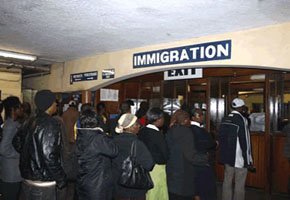


 ZIMBABWEANS have been pouring into neighbouring South Africa in large numbers since the conclusion of the July 31 harmonised polls, a survey by The Financial Gazette has shown.
ZIMBABWEANS have been pouring into neighbouring South Africa in large numbers since the conclusion of the July 31 harmonised polls, a survey by The Financial Gazette has shown.
This trend started immediately after the harmonised elections that were won by ZANU-PF amid claims by the Movement for Democratic Change (MDC) formations that the polls were rigged. A faction of the MDC led by outgoing Prime Minister Morgan Tsvangirai has since challenged the outcome in the courts.
Officials at the Beitbridge Border Post confirmed this week that indeed the momentum at the entry and exit point linking Zimbabwe and South Africa had picked up following the conclusion of the elections.
This was corroborated by Alex Kautsiro, the chief executive officer of the Coach and Bus Operators Association, who told The Financial Gazette this week that whereas there has been no change in inward bound traffic, the organisation’s membership had noted an increase in outward bound traffic.
“As a coach and bus operators’ association we have noted a slight increase in outward bound passengers. However, of concern to us is that there is no significant increase in inward bound passengers,” he said.
Charles Gwede, the assistant regional immigration officer in charge of Beitbridge Border Post (southern region), said the number of people processed at the post had declined significantly during the period leading up to the elections. But the trend has since changed, with staff at the border post working right round the clock in order to cope with the increasing number of Zimbabweans flocking into South Africa.
“The border post is a two-way system and there has been no day where there is no traffic inflow whether going or returning from South Africa. However, during the election and voting period the traffic slowed down as there were a few people that passed through the border post,” said Gwede.
“However, there has been an upsurge of traffic within the border post as traffic and the number of people passing through the border has increased.”
Analysts said most of the people crossing into South Africa were either Zimbabweans based south of the Limpopo River who had come to cast their ballots or cross-border traders who had temporarily suspended their trips in the run-up to the elections.
But analysts could also not rule out that there could be Zimbabweans who were relocating to South Africa due to the uncertainties gripping the country following the disputed polls endorsed by most African states but dismissed by the European Union, the United States and Australia as not reflective of the will of the people.
Michael Mdladla, an analyst, said following the disputed poll outcome, there has been uncertainty in Zimbabwe as evidenced by the panic withdrawals that hit the banking sector last week.
The Zimbabwe Stock Exchange also lost more than US$1 billion inside one week because investors became risk averse amid concerns over policies that are likely to be pushed through by President Robert Mugabe’s new administration following his victory in July’s elections.
Traders have been jittery about possible plans to reintroduce the Zimbabwe dollar, for example, although Gideon Gono, governor of the Reserve Bank of Zimbabwe, last week denied that the new ZANU-PF government would reintroduce the unit, replaced in February 2009 by a multicurrency system.
There have been reports suggesting that the South African Home Affairs Department could re-introduce visa requirements for Zimbabweans to discourage them from visiting Africa’s largest economy.
Other reports had suggested that the neighbouring country could peg the visa fees at R5000 in what would make travel to South Africa a preserve for the elite few.
These reports have since been dismissed by the South African Home Affairs Department.
South Africa scrapped the visa requirement for Zimbabweans about five years ago as a result of talks between the two countries under the Joint Permanent Commission on Defence and Security that began in November 2007.
The International Organisation for Migration estimates that over 1,5 million Zimbabwean migrants live in South Africa but other estimates put the figure at more than three million.
Most of them are illegal immigrants who skipped the country in search for greener pastures during the past 13 years of economic crisis in the country.
Furthermore, a sizeable number of workers crossed into South Africa after May 2009 when Pretoria suspended visa restrictions on Zimbabweans travelling to its territory.